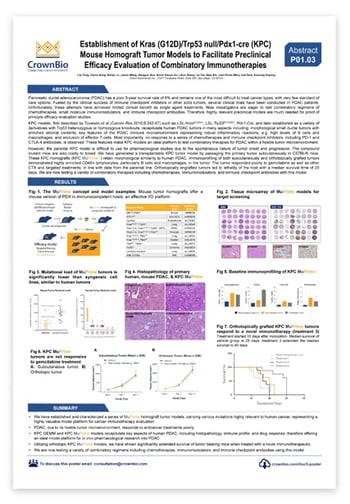- Our Services
- Platforms
- Target Solutions
- Technologies
- Service Types
- Our Science
- About Us
- Contact us
Lily Tong, Yanrui Song, Benqi Liu, Jessie Wang, Hongyan Sun, Annie Xiaoyu An, Likun Zhang, Jie Cai, Qian Shi, Jean-Pierre Wery, and Davy Xuesong Ouyang Pancreatic ductal adenocarcinoma (PDAC) has a poor 5-year survival rate and remains one of the most difficult to treat cancer types, partially due to a lack of standard of care treatment options. While immunotherapeutics have been trialed in PDAC patients, they have had limited success as single agents, creating a need for immuno-oncology models for evaluating combination regimens.
Pancreatic ductal adenocarcinoma (PDAC) has a poor 5-year survival rate and remains one of the most difficult to treat cancer types, partially due to a lack of standard of care treatment options. While immunotherapeutics have been trialed in PDAC patients, they have had limited success as single agents, creating a need for immuno-oncology models for evaluating combination regimens.
KPC models recapitulate human PDAC tumors in many aspects, importantly including a lack of response to a range of treatments including chemotherapy and immune checkpoint inhibitors, such as anti-PD-1 and PD-L1 antibodies. However, the parental KPC model is difficult to use for efficacy studies due to the spontaneous nature of tumor onset and progression.
CrownBio has therefore developed a transplantable KPC tumor model by passaging the primary tumor subcutaneously in C57BL/6 mice. The model retains morphological similarity to human PDAC, as well as a poor response to chemotherapy and targeted agents, providing an ideal model platform for in vivo pharmacological research into PDAC.
Your privacy is important to us.
We'll never share your information.
© 2025 Crown Bioscience. All Rights Reserved.
Privacy Policy | Imprint | Terms of Service | Privacy Preferences


© 2025 Crown Bioscience. All Rights Reserved. Privacy Policy
2023-05-22
2021-10-28
landing_page
PDX/Databases